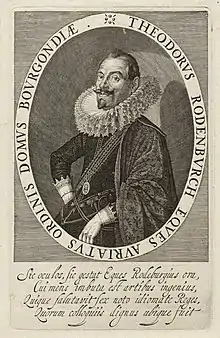Theodore Rodenburgh
Theodore Rodenburgh (baptised 29 January 1574, Antwerp - 1644) was a diplomat and playwright of the Dutch Golden Age. His first name is sometimes spelled Theodoor, and occasionally the nick-name Dirk is seen; his last name is sometimes spelled Rodenburg or Rodenberg.
Theodore Rodenburgh | |
|---|---|
 Portrait of Theodore Rodenburgh, diplomat and playwright, dressed in Spanish fashion[1] | |
| Baptized | 29 January 1574, Antwerp[2] |
| Died | 1644[1] |
| Occupation(s) | Diplomat, playwright |
| Era | Dutch Golden Age |
He was well-travelled and spoke several languages. He states that he studied in Italy and Portugal, and spent time in the French court.[3] For several years he was a trade representative in London for cities of the Hanseatic League,[3] although the dates are unclear: P.E.L. Verkuyl putting him there from December 1602 to March 1607,[4] and Nigel Smith favoring the dates "1601 until after June 1610".[5]
He was an envoy to the court of Philip III of Spain in Madrid from 1611 to 1613, where he likely attended performances of comedias.[6] He was the first to adapt Spanish comedias into Dutch; four of these adaptations were staged, then subsequently printed in 1617-1618.[6]
He was appointed chairman of "The Eglantine" chamber of rhetoric in 1617, shortly after the exit of playwrights Samuel Coster, Pieter Corneliszoon Hooft, and Gerbrand Bredero who formed the competing First Dutch Academy.[7] In support of The Eglantine, Rodenburgh published the Eglentiers Poëtens Borst-Weringh, a discussion of poetics based largely on Sir Philip Sidney's Apologie for Poetrie and Thomas Wilson's Arte of Rhetorique, but also influenced by Lope de Vega's Arte nuevo de hacer comedias en este tiempo (New Art of Writing Plays at This Time).[8]
The first part of King Otto III was published in 1616, and the second and third parts in 1617, but whether it was ever performed is unknown.[9]
Although his plays were very popular in his lifetime, his literary reputation quickly fell into disrepute and neglect, due in part to his use of techniques which were deemed insufficiently classicist.[1] These were not blunders on Rodenburgh's part, but the results of his conscious emulation of Lope de Vega who embraced variety in emotion, plot, character, location, time, and meter ... a far cry from the rationalism and unities of time, place, and plot demanded by neoclassical writers and theorists.
Adaptations
- Casandra Hertoginne van Borgonie, en Karel Baldeus (published 1617) — a tragicomedy, based on Lope de Vega's El perseguido ("The Pursued")[6]
- Hertoginne Celia en Grave Prospero (published 1617) — a comedy, based on Lope de Vega's El molino ("The Miller")[6]
- Jalourse studentin (alternatively entitled Ialoerse Studenten) (published 1617) — a comedy, based on Lope de Vega's La escolástica celosa[6]
- ’t Quaet sijn meester loondt (published 1618) — a comedy, based on Gaspar Aguilar's La venganza honrosa[6]
- Wraeck-gierigers treurspel (published 1618) — a tragedy, based on Thomas Middleton's Revenger's Tragedy
Notes
- Vergeer 2017.
- Verkuyl 2017, p. 154.
- Abrahamse 1993, p. 201.
- Verkuyl 2017, p. 152.
- Smith 2018.
- Marion & Vergeer 2016, p. 41.
- Marion & Vergeer 2016, p. 42.
- Vergeer 2016, p. 21.
- Abrahamse 1993, p. 200.
References
Dutch
- Abrahamse, Wouter (1993). "Schaken en liefdesverdriet in Keyser Otto den derden van Theodore Rodenburgh". Literatuur. 10: 200–206. ISSN 0168-7050.
English
- Marion, Olga van; Vergeer, Tim (2016). "Spain's dramatic conquest of the Dutch Republic: Rodenburgh as a literary mediator of Spanish theatre". De Zeventiende Eeuw. 32: 40–60. doi:10.18352/dze.10151. eISSN 2212-7402. hdl:1887/54701. ISSN 0921-142X.
- Smith, Nigel (24 May 2018). "Polyglot Poetics: Transnational Early Modern Literature, part II". The Collation. Folger Shakespeare Library. Retrieved 9 November 2019.
- Vergeer, Timothy (June 2016). Lustful Love and Atrocious Angst: The Affective Operations of the Comedia Nueva and the Senecan-Scaligerian Playwriting in Amsterdam 1617-1672 (PDF) (Thesis). Leiden University. hdl:1887/42825.
- Vergeer, Tim (30 November 2017). "The Personal Tragedy of the Popular Theodore". Leiden Arts in Society Blog. Universiteit Leiden. Retrieved 25 August 2019.
- Verkuyl, P. E. L. (2017). "Geomancy in an Early Play by Theodore Rodenburgh". In Hermans, Theo; Salverda, Reinier (eds.). From Revolt to Riches: Culture and History of the Low Countries, 1500–1700. Translated by Riewald, J. G. London: UCL Press. pp. 152–166. ISBN 978-1910634882. JSTOR j.ctt1n2tvhw.19.
External links
Dutch editions
- Keyser Otto III (Part 1) at the Internet Archive
- Keyser Otto III (Part 2) at the Internet Archive
- Keyser Otto III (Part 3) at the Internet Archive
- Den Trouwen Batavier at the Internet Archive
- Casandra Hertoginne van Borgonie en Karel Baldeus at the Internet Archive
- 'T Quaedt Syn Meester Loondt at the Internet Archive
- Eglentiers echts-aenraedingh, In Liefd Bloeyende at the Internet Archive
- Eglentiers poëtens borst-weringh at the Internet Archive
- Batavierse vryagie at the Internet Archive
- Mays at the Internet Archive
- Vrou Iacoba, erf-gravinne van Hollandt at the Internet Archive
- Jaloersche studenten at the Internet Archive
- Hertoginne Celia en grave Prospero at the Internet Archive
- Wraeck-gierigers treur-spel at the Internet Archive